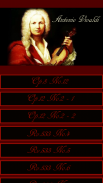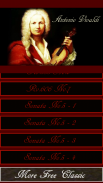






Antonio Vivaldi

Description of Antonio Vivaldi
Antonio Lucio Vivaldi was an Italian Baroque composer, virtuoso violinist, teacher and cleric. Born in Venice, he is recognized as one of the greatest Baroque composers, and his influence during his lifetime was widespread across Europe. He is known mainly for composing many instrumental concertos, for the violin and a variety of other instruments, as well as sacred choral works and more than forty operas. His best-known work is a series of violin concertos known as The Four Seasons.
Many of his compositions were written for the female music ensemble of the Ospedale della Pietà, a home for abandoned children where Vivaldi was employed from 1703 to 1715 and from 1723 to 1740. Vivaldi also had some success with expensive stagings of his operas in Venice, Mantua and Vienna. After meeting the Emperor Charles VI, Vivaldi moved to Vienna, hoping for preferment. However, the Emperor died soon after Vivaldi's arrival, and Vivaldi himself died less than a year later in poverty.
Vivaldi's music was innovative. He brightened the formal and rhythmic structure of the concerto, in which he looked for harmonic contrasts and innovative melodies and themes; many of his compositions are flamboyantly, almost playfully, exuberant.
Johann Sebastian Bach was deeply influenced by Vivaldi's concertos and arias.
Bach transcribed six of Vivaldi's concerti for solo keyboard, three for organ, and one for four harpsichords, strings, and basso continuo based upon the concerto for four violins, two violas, cello, and basso continuo.
























